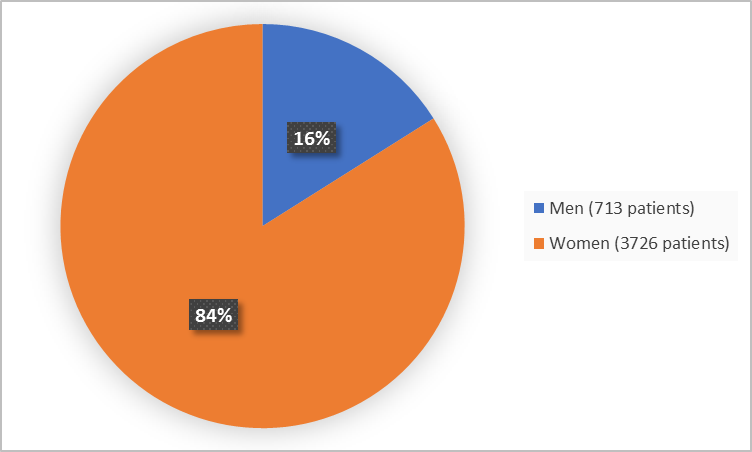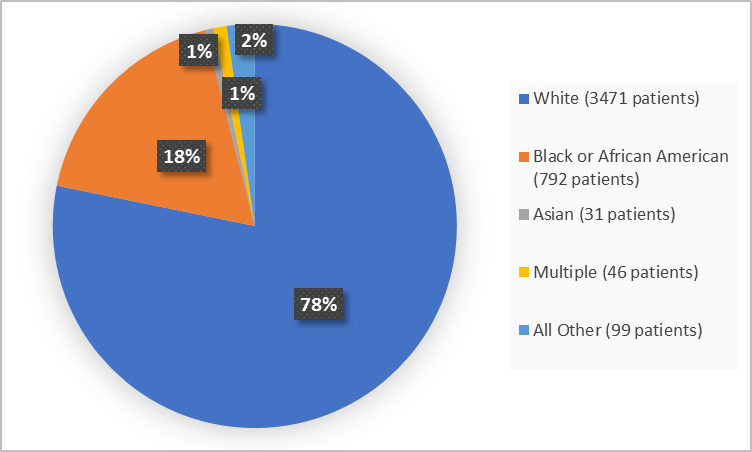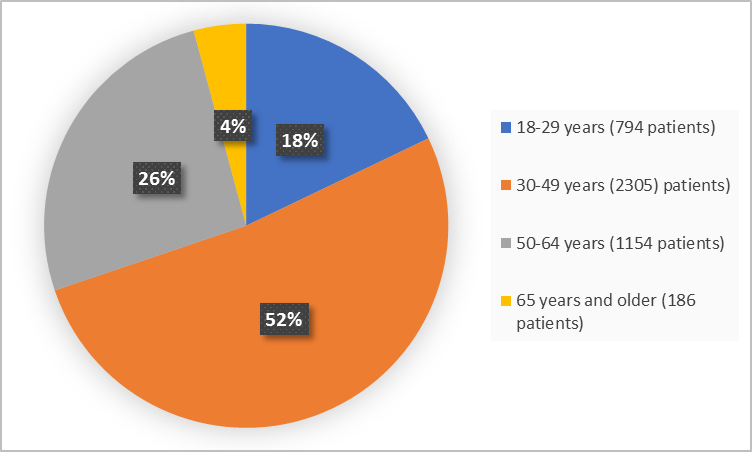A new DRUG TRIALS SNAPSHOT is now available.

REYVOW is a drug used for the acute treatment of migraine with or without aura in adults.
A migraine is a type of headache that, in addition to pain, can be associated with nausea, vomiting, and/or sensitivity to light or sound. Patients who suffer from migraines with aura develop temporary visual or other signs and symptoms shortly before or at the time of headache onset.
REYVOW is a tablet taken by mouth, as needed.
See more Drug Trials Snapshots or contact us with questions at Snapshots@fda.hhs.gov.
Drug Trials Snapshots: REYVOW
REYVOW (lasmiditan)
Rā – vaü
Elly Lilly and Company
Approval date: October 11, 2019
Rā – vaü
Elly Lilly and Company
Approval date: October 11, 2019
DRUG TRIALS SNAPSHOT SUMMARY:
What is the drug for?
REYVOW is a drug used for the acute treatment of migraine with or without aura in adults.
A migraine is a type of headache that, in addition to pain, can be associated with nausea, vomiting, and/or sensitivity to light or sound. Patients who suffer from migraines with aura develop temporary visual or other signs and symptoms shortly before or at the time of headache onset.
How is this drug used?
REYVOW is a tablet taken by mouth, as needed.
What are the benefits of this drug?
A higher percentage of patients who received REYVOW were pain free two hours after the treatment, in comparison to patients who received placebo. Also, a higher percentage of patients who received REYVOW were free of their most bothersome migraine associated symptoms (such as light sensitivity, sound sensitivity, or nausea) two hours after the treatment, in comparison to patients who received placebo.
Were there any differences in how well the drug worked in clinical trials among sex, race and age?
- Sex: REYVOW worked similarly in men and women.
- Race: REYVOW worked similarly among racial groups.
- Age: REYVOW worked similarly in patients younger or older than 65 years of age.
What are the possible side effects?
REYVOW may cause significant drowsiness, therefore driving should be avoided until at least 8 hours after taking REYVOW. Other serious side effects include sedation, the potential for medication overuse headache, and serotonin syndrome. Serotonin syndrome is a rare, serious, and potentially life threating condition which may be more likely to occur if REYVOW is used with antidepressants called SSRIs or SNRIs.
The most common side effects of REYVOW are dizziness, fatigue, tingling in extremities (paresthesia), and sleepiness.
Were there any differences in side effects among sex, race and age?
- Sex: The occurrence of side effects was similar in men and women.
- Race: The occurrence of side effects was similar in racial groups with exception of dizziness occurring more frequently in White and Asian patients.
- Age: The occurrence of overall side effects was similar in patients younger or older than 65 years of age. Dizziness and a larger increase in systolic blood pressure occurred more frequently in patients who were at least 65 years of age compared to patients who were less than 65 years of age.
WHO WAS IN THE CLINICAL TRIALS?
Who participated in the clinical trials?
The FDA approved REYVOW primarily based on data from 2 clinical trials, Trial 1 (# NCT02439320) and Trial 2 (#NCT02605174) of 4439 patients with migraine headaches with or without aura. Trials were conducted at 224 sites in the United States, the United Kingdom, and Germany.
Demographics of patients who provided data for evaluation of efficacy are presented in Tables 9 and 10 under MORE INFO.
Demographics of patients who provided data for evaluation of side effects (safety population) are presented below.
Figure 1 summarizes how many men and women were in the clinical trials used to evaluate safety.
Figure 1. Baseline Demographics by Sex (safety population)
FDA Review
Figure 2 summarizes the percentage of patients by race in the clinical trials used to evaluate safety.
Figure 2. Baseline Demographics by Race (safety population)
Table 1. Demographics of Safety Trials by Race
| Race | Number of Patients | Percentage of Patients |
|---|---|---|
| White | 3471 | 78 |
| Black or African American | 792 | 18 |
| Asian | 31 | 1 |
| American Indian or Alaska Native | 27 | 1 |
| Native Hawaiian or other Pacific Islander | 13 | Less than 1 |
| Multiple | 46 | 1 |
| Other | 59 | 1 |
FDA Review
Figure 3. Baseline Demographics by Age (safety population)
FDA Review
How were the trials designed?
The FDA approved REVYOW based primarily on data from two clinical trials of adult patients with a history of migraine with or without aura.
The design of Trials 1 and 2 was similar. Adult patients with migraine were assigned to receive one of two (Trial 1) or three (Trial 2) doses of REYVOW or placebo within 4 hours of the onset of a moderate to severe migraine attack. Patients had to report on the status of their pain and their associated migraine symptoms (including light or sound sensitivity or nausea). Neither the patients nor the health care providers knew which treatment was being given until after the trial was completed.
The benefit of REYVOW was assessed based on the percentage of patients who became pain free within 2 hours and comparing it with placebo treated patients. The assessment also included the percentage of patients who were free of their associated most bothersome migraine symptom within 2 hours of taking the trial drug.
Patients who completed Trials 1 and 2 could enroll in one additional trial. They were randomized to either 100 mg or 200 mg of REYVOW and could treat all migraine attacks for up to 12 months. The data from this trial were used to assess the long-term side effects of REYVOW.
GLOSSARY
CLINICAL TRIAL: Voluntary research studies conducted in people and designed to answer specific questions about the safety or effectiveness of drugs, vaccines, other therapies, or new ways of using existing treatments.
COMPARATOR: A previously available treatment or placebo used in clinical trials that is compared to the actual drug being tested.
EFFICACY: How well the drug achieves the desired response when it is taken as described in a controlled clinical setting, such as during a clinical trial.
PLACEBO: An inactive substance or “sugar pill” that looks the same as, and is given the same way as, an active drug or treatment being tested. The effects of the active drug or treatment are compared to the effects of the placebo.
SUBGROUP: A subset of the population studied in a clinical trial. Demographic subsets include sex, race, and age groups.
COMPARATOR: A previously available treatment or placebo used in clinical trials that is compared to the actual drug being tested.
EFFICACY: How well the drug achieves the desired response when it is taken as described in a controlled clinical setting, such as during a clinical trial.
PLACEBO: An inactive substance or “sugar pill” that looks the same as, and is given the same way as, an active drug or treatment being tested. The effects of the active drug or treatment are compared to the effects of the placebo.
SUBGROUP: A subset of the population studied in a clinical trial. Demographic subsets include sex, race, and age groups.





































No hay comentarios:
Publicar un comentario